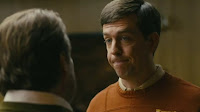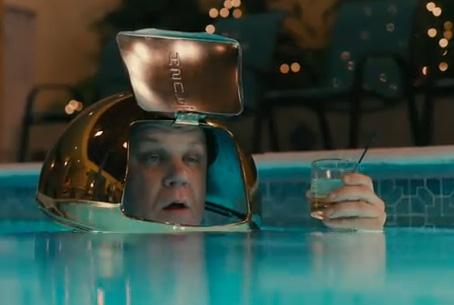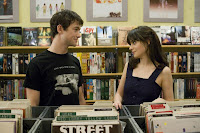 When done right, two genres can somehow fit together quite well. Even if one of them is a little immature, and the other tries to be sophisticated.
When done right, two genres can somehow fit together quite well. Even if one of them is a little immature, and the other tries to be sophisticated.




 When done right, two genres can somehow fit together quite well. Even if one of them is a little immature, and the other tries to be sophisticated.
When done right, two genres can somehow fit together quite well. Even if one of them is a little immature, and the other tries to be sophisticated.



 Face it, all romantic films turn out the same. In that light, it doesn’t matter what happens in the end, but rather how you get to that end point. That could include the events that occur throughout the film, or the larger context in which those events happen. In a world where romance seems dead, “The Kids Are All Right” is there to kick that notion right in the butt.
Face it, all romantic films turn out the same. In that light, it doesn’t matter what happens in the end, but rather how you get to that end point. That could include the events that occur throughout the film, or the larger context in which those events happen. In a world where romance seems dead, “The Kids Are All Right” is there to kick that notion right in the butt.
As much as people like to make fun of where the Indie genre has gone, give it credit for continuing to make common ideas seem fresh. “The Kids Are All Right” is a mixture of suburban boredom with teen angst and sexual confusion. The centerpiece couple is lesbians Nic (Annette Benning) and Jules (Julianne Moore). Nic takes on the uptight parent role, while Jules is more open-minded. However, they are both equally motherly.
Jules and Nic have two children: the brainy and sexually repressed Joni (Mia Wasikowska) and the just plain confused Laser (Josh Hutcherson). After discovering their origins, the two become curious about who their real father is. They find out he is a semi-hippie named Paul (Mark Ruffalo). Despite being a college dropout, Paul now runs a successful organic farming business and restaurant. The kids meet Paul, and they get along quite well. Something about Paul might seem strange, but Ruffalo’s constantly calm and always reassuring voice quells all fears.
The rest of “The Kids Are All Right” is one of those films whose story doesn’t stem off of a major event but rather a person. Every action that happens in the rest of the film happens as a direct result of the family’s contact with Paul.
“The Kids Are All Right” goes at two contradicting paces. First off, it goes slow. It takes its time and enjoys itself while doing so. At the same time, it feels so energetic and lively. Even if you can feel the running time, you’ll never feel bored. The film definitely chews up the beautiful Southern California scenery.
The music that director Lisa Cholodenko chose also fits in perfectly. The film’s opening track is Vampire Weekend’s “Cousins.” I am usually irked when films use recent, popular music. It can feel like they’re just capitalizing off of something popular rather than actually choosing the right songs. However, “Cousins” is well chosen. It projects both a strangely happy mood as well as a sense of the twisted family troubles on the horizon.
Once again, “The Kids Are All Right” doesn’t contain the lightning-fast storytelling common place in most films made today. Even though I could definitely feel every moment, I would’ve been fine with sitting in the theater for another two hours with these characters. That’s what good storytelling does: it puts you into a convincing universe and lets you out whenever it damn well feels like letting you out. “The Kids Are All Right” ended where it wanted to end because it earned the right to.
This film contains an ensemble worthy of a SAG Award. Benning shows so many flared up, mixed emotions both through her words and even more powerfully, body expressions. Moore is a powerhouse of warmth and motherly humor. Then there’s also Wasikowska. I thought she showed potential in “Alice in Wonderland,” but she just needed a project that was actually, well, good. After “The Kids Are All Right,” she has proven herself ready to take on even more challenging roles.
Along with great acting, “The Kids Are All Right” certainly has one of the best screenplays this year. It’s so insightful and downright hilarious. It embraces awkwardness at all the right moments.
But beyond its witty and thoughtful dialogue there lies something within the film that is almost groundbreaking. For one of the first times, a gay couple was portrayed just like any other couple would be portrayed. The film so truthfully shows what it would feel like to have two moms. That opening dinner scene felt so unbelievably real in the way the characters interact with each other. The “L word” isn’t in site at any point. In an ever troublesome world, “The Kids Are All Right” is a sign of the times that actually makes me feel good about the time I’m growing up in.
Even though you know where the makers of “The Kids Are All Right” lean, this film never at one point tries to make a political statement. It is simply trying to tell a good story, which it does quite well. In its exploration of the meaning of family and the troubles of sex, it evokes the best social commentaries of the 1970s as well as such other great films as “Juno” and “American Beauty.” “The Kids Are All Right” proves that maybe the kids will turn out all right. Hopefully, more movies will follow in its footsteps and turn out all right, too.

 And now everyone, time to breath that collective sigh of fresh air. “Cyrus” has arrived. It’s a comedy that’s not too ridiculous, and a drama that’s not too, well, overly dramatic; it’s just right. But then again, it’s also ever so wrong.
And now everyone, time to breath that collective sigh of fresh air. “Cyrus” has arrived. It’s a comedy that’s not too ridiculous, and a drama that’s not too, well, overly dramatic; it’s just right. But then again, it’s also ever so wrong.
The Duplass Brothers have mastered a style of both extreme awkwardness and a dominant feeling of being uncomfortably real. You can see that by their very odd yet innovative camera style. The camera never quite stays still. Even when focusing on one character, it still jiggles around and constantly goes in and out of focus.
It is also worth noting how the film’s title character isn’t even given a first person perspective. However, he may very well be the main character. Perhaps the film is about how all of these different people see “Cyrus.” Or maybe it’s about how Cyrus’s horrible actions cause people’s lives to fall apart. One thing is certain though: his character is too mysterious, and his inner workings too creepy, to be given a first person voice. It’s more entertaining to try and understand his thoughts and motives as the rest of the characters do.
As you watch more and more movies, even when watching a good one, you still get a sense that you can take past films as precedent and know exactly where the movie you’re watching is headed. “Cyrus” is resistant to that. It’s not trying to impress, and it’s not even trying to get you to like the characters. That comes out of your own opinion. It doesn’t even end on a note of certainty. There is a feeling of certainty that we know what will happen to the characters next, but we don’t need to see it. It will just…happen.
“Cyrus” is as real and funny as the people you know, or the people you never wanted to know. It proves that a raunchy joke, or a grown man standing in nothing but a t-shirt and holding a giant knife, can be funny and sophisticated. Oh, and I’ll emphasize once again that it’s weird. However, it’s the kind of weirdness that feels so unique. More directors should be like the Duplass Brothers: not afraid of throwing away Hollywood convention in order to tell a perfectly good story.
 Hollywood loves sequels. They love it. They’re a little too in love though. If Hollywood wants to continue banking off of franchise-worthy films, they should consider spin-offs over sequels. “Get Him to the Greek” shows that perhaps individual characters, and not entire plots, were meant to be seen again.
Hollywood loves sequels. They love it. They’re a little too in love though. If Hollywood wants to continue banking off of franchise-worthy films, they should consider spin-offs over sequels. “Get Him to the Greek” shows that perhaps individual characters, and not entire plots, were meant to be seen again.
 To my absolute greatest shock I will say: after a dry spell, someone was finally able to make a good “Saturday Night Live” movie. All it took was some inspiration, and a guy who is involved with the existence of “Hot Rod.”
To my absolute greatest shock I will say: after a dry spell, someone was finally able to make a good “Saturday Night Live” movie. All it took was some inspiration, and a guy who is involved with the existence of “Hot Rod.”

 In his review of “Shutter Island,” the New Yorker’s Anthony Lane drew upon a quote from Umberto Eco: “Two cliches make us laugh but a hundred cliches move us, because we sense dimly that the cliches are talking among themselves, celebrating a reunion.” Lane was using this to describe a totally different movie, but I think it fits even more perfectly into “Hot Tub Time Machine.”
In his review of “Shutter Island,” the New Yorker’s Anthony Lane drew upon a quote from Umberto Eco: “Two cliches make us laugh but a hundred cliches move us, because we sense dimly that the cliches are talking among themselves, celebrating a reunion.” Lane was using this to describe a totally different movie, but I think it fits even more perfectly into “Hot Tub Time Machine.”
 Some things are too ridiculous to be true. Other things, when put into the right context, are too ridiculous to not be true. This is the very case for “In the Loop.” Its a very relevant political satire about ridiculous characters and situations during a very ridiculous period in history.
Some things are too ridiculous to be true. Other things, when put into the right context, are too ridiculous to not be true. This is the very case for “In the Loop.” Its a very relevant political satire about ridiculous characters and situations during a very ridiculous period in history.
 After I saw “It’s Complicated,” I pondered one of the greatest questions of all: what makes a solid comedy? The answer is complicated. Though it does contain a few good gags, “It’s Complicated” doesn’t totally answer the question.
After I saw “It’s Complicated,” I pondered one of the greatest questions of all: what makes a solid comedy? The answer is complicated. Though it does contain a few good gags, “It’s Complicated” doesn’t totally answer the question.
 It seems fitting that “Extract” takes place in a vanilla extract factory, since the film is about as plain as the flavor itself. And the saddest part is, it comes from one of Hollywood’s most creative directors.
It seems fitting that “Extract” takes place in a vanilla extract factory, since the film is about as plain as the flavor itself. And the saddest part is, it comes from one of Hollywood’s most creative directors.
 Ad campaigns can often be misleading. They can make a bad movie look good, and a good movie look bad. Other times, they can make a totally original, breath of fresh air seem like a cliche drag. That was just about the case for “(500) Days of Summer.” All I can say is, the final product totally proved me wrong.
Ad campaigns can often be misleading. They can make a bad movie look good, and a good movie look bad. Other times, they can make a totally original, breath of fresh air seem like a cliche drag. That was just about the case for “(500) Days of Summer.” All I can say is, the final product totally proved me wrong.